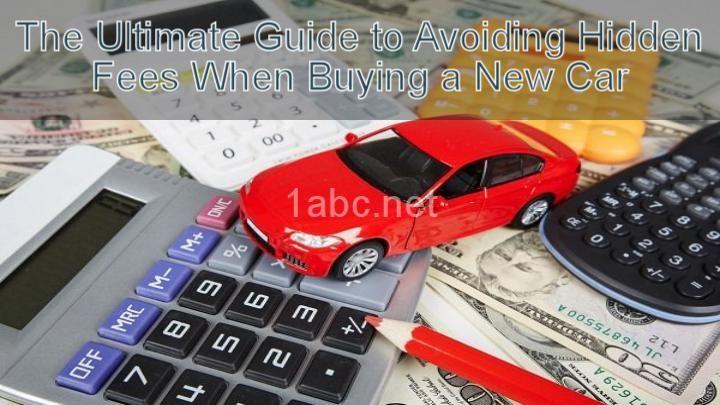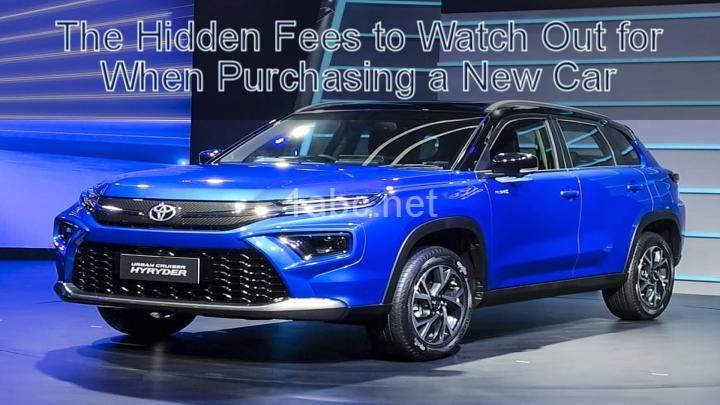The Ultimate Guide to Avoiding Hidden Fees When Buying a New Car

Introduction:
Buying a new car is an exciting experience, but it can also be a costly one if you're not careful. Hidden fees can quickly add up and turn what seemed like a great deal into a financial burden. That's why it's crucial to be aware of these fees and take steps to avoid them. By following this ultimate guide, you can save money and make more informed decisions during your car-buying journey.
I. Research and Preparation:
A. Set a Budget:
Before you start shopping for a new car, it's essential to set a budget that you can comfortably afford. Take into account not only the purchase price of the car but also additional costs such as taxes, insurance, and maintenance. By considering these factors upfront, you can avoid any unexpected financial strain down the road.
To determine an affordable budget, evaluate your monthly income and expenses. Consider how much you can allocate towards car payments without compromising your other financial obligations. It's also wise to leave room in your budget for unexpected expenses or emergencies that may arise.
B. Compare Prices:
One of the most effective ways to avoid hidden fees is to compare prices from different dealerships. Utilize online tools to research the prices of the car you're interested in and visit multiple dealerships to get a sense of the market.
Don't be afraid to negotiate for the best possible deal. Dealerships often have some flexibility in pricing, and by doing your research, you'll be better equipped to negotiate a fair price. Remember, it's not just about the purchase price but also about avoiding hidden fees that may be tacked on.
C. Understand Financing Options:
Understanding your financing options is crucial when it comes to avoiding hidden fees. Take the time to research different financing options available to you, such as loans or leasing. Compare interest rates, terms, and any potential fees associated with each option.
By obtaining preapproved financing from other lenders before visiting dealerships, you can compare offers and potentially leverage better deals. This also gives you a baseline to negotiate from and ensures you're not at the mercy of the dealership's financing terms.
II. Identifying Hidden Fees:
A. Destination Charges:
One common hidden fee is the destination charge, which is the cost of transporting the vehicle from the manufacturer to the dealership. Destination charges can vary between different car models, and they're often non-negotiable.
However, there are ways to reduce this fee. You can try negotiating with the dealership to lower the destination charge or look for alternative ways to purchase the car, such as ordering directly from the manufacturer and picking it up yourself. By being aware of destination charges and exploring your options, you can avoid unnecessary expenses.
B. Dealer Add-Ons:
Dealerships often try to upsell customers on various add-ons, such as extended warranties, VIN etching, or paint protection. While some of these extras may offer value, it's crucial to carefully evaluate if they're necessary for you.
Before agreeing to any add-ons, research their cost and whether they can be purchased elsewhere for a lower price. Additionally, don't be afraid to negotiate the price of these add-ons. Dealerships have some flexibility in pricing, and you may be able to get a better deal by being informed and confident during the negotiation process.
C. Documentation Fees:
Documentation fees, also known as "doc fees," are charges imposed by dealerships to cover the cost of paperwork and administrative tasks related to the car purchase. These fees can vary from dealership to dealership.
While documentation fees are legal, it's important to understand their purpose and whether they can be negotiable. When negotiating the overall price of the car, you can also try negotiating or even waiving these fees. Some dealerships may be willing to work with you, especially if you're a well-informed and confident buyer.
III. Negotiating Strategies:
A. Be Informed and Confident:
To negotiate effectively and avoid hidden fees, it's crucial to be well-informed. Research the car's value, market trends, and competitor offers. By having this knowledge, you'll have a better understanding of what is a fair price and be able to negotiate confidently.
Don't be afraid to ask questions and seek clarification during the negotiation process. Remember, you are the customer, and it's your right to fully understand the terms and conditions of the purchase. Be confident in asserting your needs and preferences, and don't settle for less than what you're comfortable with.
B. Use Preapproved Financing:
Securing preapproved financing from other lenders before visiting dealerships can give you an advantage during negotiations. By having a preapproved offer in hand, you can compare it to the dealership's financing options and potentially leverage better deals.
Dealerships may try to offer you financing with higher interest rates or additional fees. By having an alternative financing option, you can confidently negotiate for better terms or choose to stick with your preapproved offer if it's more favorable.
C. Focus on Out-the-Door Price:
When negotiating, it's important to focus on the out-the-door price rather than just the purchase price of the car. The out-the-door price includes all fees and taxes, giving you a clear picture of the total cost of the car.
By negotiating based on the out-the-door price, you can avoid surprises when it comes time to sign the contract. This ensures that there are no hidden fees waiting for you in the fine print and helps you make a more informed decision.
IV. Reviewing the Contract:
A. Carefully Read and Understand:
Before signing anything, it's crucial to thoroughly read and understand the contract. Take the time to review each section, paying close attention to the terms and conditions, as well as any additional fees listed.
If you come across any unclear terms or unexpected fees, don't hesitate to ask for clarification. It's better to address any concerns before signing the contract than to be surprised later on.
B. Question Any Extra Fees:
During your contract review, be on the lookout for any unexpected fees that may have been added. Some common hidden fees that may appear at this stage include dealer preparation fees, advertising fees, or title and registration fees.
If you come across any extra fees that you were not made aware of during the negotiation process, question and negotiate them. Don't be afraid to walk away from the deal if the dealership is unwilling to address your concerns.
Conclusion:
Avoiding hidden fees when buying a new car is crucial to saving money and making more informed decisions. By setting a budget, comparing prices, understanding financing options, and being aware of common hidden fees, you can navigate the car-buying process with confidence.
Remember to negotiate based on your research, focus on the out-the-door price, and thoroughly review the contract before signing. By being proactive, informed, and confident, you can avoid hidden fees and ensure a more satisfying car-buying experience.
FREQUENTLY ASKED QUESTIONS
What is The Ultimate Guide to Avoiding Hidden Fees When Buying a New Car?
The Ultimate Guide to Avoiding Hidden Fees When Buying a New Car is a comprehensive resource that provides valuable tips and strategies to help car buyers navigate the potential pitfalls of hidden fees. This guide offers step-by-step advice on how to research, negotiate, and ultimately purchase a new car without falling victim to unexpected expenses. It covers a wide range of topics, including understanding common dealership fees, identifying add-on costs, effectively negotiating the final price, and much more. Whether you're a first-time car buyer or an experienced shopper, this guide is a valuable tool to ensure you get the best deal possible and avoid being blindsided by hidden fees.
Are hidden fees common when buying a new car?
Hidden fees can be common when buying a new car. These fees are often not clearly advertised or disclosed until you are in the final stages of the purchase process. Some examples of hidden fees that you may encounter when buying a new car include documentation fees, administrative fees, advertising fees, and dealer preparation fees. It's important to carefully review your purchase agreement and ask questions to ensure that you are aware of and understand any potential hidden fees before finalizing your new car purchase.
Can I use this guide when buying a used car as well?
Absolutely! This guide can be applied when buying both new and used cars. The tips and considerations are relevant regardless of whether you're purchasing a brand new vehicle or a pre-owned one. Just make sure to adjust your expectations and considerations accordingly based on the age, condition, and history of the used car.
How can I purchase The Ultimate Guide to Avoiding Hidden Fees When Buying a New Car?
To purchase "The Ultimate Guide to Avoiding Hidden Fees When Buying a New Car," you can follow these steps:
- Visit the website or online marketplace where the book is available for purchase.
- Search for the title of the book in the search bar.
- Once you find the book, click on it to see more details.
- Check the price and any additional information provided about the book.
- Look for an option to add the book to your cart or proceed with the purchase.
- If required, create an account or login to your existing account.
- Provide the necessary payment details such as credit card information or use a payment method linked to your account.
- Review the purchase details and confirm your order.
- After successful payment, you may receive a confirmation email with the order details and any instructions on how to access or download the book.
- Depending on the delivery method chosen (e.g., physical copy or digital download), you will receive the book accordingly.
Please note that the availability, pricing, and purchase process may vary depending on the specific website or marketplace where you choose to buy the book.
What are hidden fees when buying a new car?
When buying a new car, there are several hidden fees that you should be aware of. These fees are often not included in the initial price of the car and can significantly increase the overall cost. Some common hidden fees include:
- Dealer fees: Dealerships often charge administrative and processing fees for paperwork and other related tasks. These fees can vary in amount and are usually non-negotiable.
- Destination charge: This fee covers the cost of transporting the vehicle from the factory to the dealership. It is usually included in the manufacturer's suggested retail price (MSRP) but may be listed separately.
- Sales tax and registration fees: These fees vary based on your location and are required to register the vehicle and obtain license plates.
- Documentation fees: Sometimes referred to as "doc fees," these fees cover the cost of preparing and processing the paperwork for the sale. They can range from a few hundred dollars to several hundred dollars.
- Advertising fees: Some dealerships charge a fee to cover their advertising expenses. This fee may be included in the MSRP or added separately.
- Extended warranties and add-ons: Dealerships often offer extended warranties and additional products or services, such as paint protection or car alarms. These can add to the overall cost of the car if you choose to purchase them.
- Financing fees: If you finance the vehicle through the dealership, there may be additional fees associated with the loan, such as loan origination fees or prepayment penalties.
- Dealer-installed options: Sometimes dealerships add additional features or accessories to vehicles, such as window tinting or upgraded sound systems. These options may come with an extra cost.
- Trade-in fees: If you are trading in your old vehicle, some dealerships may charge additional fees for assessing and appraising its value.
It's important to carefully review the contract and ask questions about any fees that are unclear.




